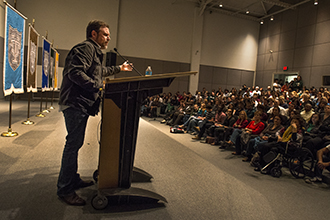The luxury of being white
For those familiar with the work of antiracist author and lecturer Tim Wise, his presentation on the Tulane University uptown campus Monday evening (Nov. 4) touched on many familiar themes, including white privilege, the internalization of unconscious bias and the busting of common racially based myths.

In his lecture Monday, Tim Wise challenged the notion that Americans are living in a post-racial society. (Photo by Ryan Rivet)
Taking on critics of the book, Wise documented a “persistent unwillingness” of many white people to acknowledge evidence of racial disparity, citing Gallup surveys from the early 1960s in which large majorities of whites said they believed racial minorities were treated equally in terms of housing, education and employment.
“Apparently white folks could look right in the teeth of oppression and still not see what people of color had to see as a matter of daily life,” Wise told his audience. “What does it mean that even when it was that blatant, white Americans didn't see it, and what does that tell you about now?”
Though the audience that filled the Freeman Auditorium to capacity was racially and ethnically diverse, Wise, who is white, often directed his comments to other white people in the room.
“To be white whether 50 years ago or this week is to have the luxury of not knowing anything about this topic and never having to pay anything for your obliviousness,” said Wise. “It is never having to know black and brown folks' truth.
“If you are going to deny the fundamental social truth that other people live every day, understand that they are going to think that that is racist,” said Wise in conclusion. “Until we are prepared to say enough of that, we are going to keep kicking this problem down the road to the next generation.”
